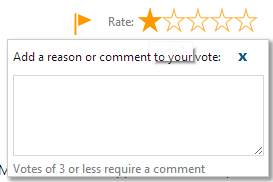I strongly dislike suggestions about changing our system or "way of doing things" for the benefit of a sub-group of users who will abuse the site regardless of such innovations. So recent discussion around the topic hasn't been enthralling.
But, in reading a recent suggestion about imposing a 24 hour "vote freeze" on meta-linked questions, I saw what I think is an excellent idea from Paul Draper that deserved a bit more attention: voting with stars, rather than arrows.
Rather than displaying an up arrow (heaven/the sky/life) and a down arrow (hell/caves/death) and positive numbers (awards/money/power) and negative numbers (punishment/poverty/weakness), what if we just displayed a 0-5 star rating that averaged the votes?
This would take care of several possible problems with "one stone":
Absolute vote counts aren't a good indicator of quality.
As I've said before, an answer with a score of "10" doesn't tell me much about the quality of that answer. If the vote is 10/0, it's probably good. If the vote is 100/-90, then the quality is probably suspect. Why should an old, out of date answer with a score of 100/-90 be ranked above a newer, better answer with a score of 8/0?
A star rating that averaged all the votes would provide a much clearer picture of just how "good" the question, or especially answer, actually is without the expense of hitting the server to get the complete voting history.
Binary voting is tricky with "so-so" questions and answers.
- Sometimes an answer is pretty good, but not great. It might be correct overall, but have some bad practices within it. I'd like to recommend it to others, but with some caution. A downvote doesn't acknowledge the good content but an upvote doesn't admit the poorer-quality content. Edits in such cases are discouraged as "best practice" is subjective. Comments are temporary things that should not be relied on. A scaled vote would provide more nuance and better represent how I and other professionals gauge the content.
People don't get as upset over stars.
This is the least important aspect in my opinion, but may speak to the current discussion about freezing posts and transforming Meta into a mentoring station.
The noisiest and most annoying users are those that complain about a single downvote on a question with 10 upvotes. If that downvote was a two star rating (yay! +2!) instead of a downvote (boo! -1!) then maybe we could achieve the same ranking effect without all of the moaning, groaning and angst.
Posts with no votes would show with N/A (or something similar). The ranking could be something like:
 - 0 stars.
- 0 stars.
This question/answer has some serious issues that can't be easily resolved. It may need to be closed/deleted.
OP Rep -= 2 (Answer/Question)
 - 1 star.
- 1 star.
This question/answer has some glaring issues that might be resolved with heavy editing.
OP Rep -= 1 (Answer/Question)
 - 2 stars.
- 2 stars.
This question/answer has some big issues but also some valuable content. It should be edited.
OP Rep += 0 (Answer/Question)
 - 3 stars.
- 3 stars.
This question/answer has valuable content but also some minor issues. Editing is optional.
OP Rep += 5 (Answer) 3 (Question)
 - 4 stars.
- 4 stars.
This question/answer has very valuable content but may also have some minor issues. Editing is probably not necessary.
OP Rep += 10 (Answer) 5 (Question)
 - 5 stars.
- 5 stars.
This question/answer is excellent in every regard and can be referred to/trusted without reservation.
OP Rep += 10 (Answer) 5 (Question)
Voters would also get a -1 reputation hit for rating a question/answer as 0 or 1. Maybe just 0. Not sure about that.
Pros
Such a system could easily address some of the biggest (and some smaller) concerns without making the act of voting any more difficult. Those who still prefer a binary system could just vote with 1/5 or 0/5 and go on their merry way. Those who want to provide a more measured or nuanced response would have the ability to do so rather than just refrain from voting, which is what I most often do. And the averaged score would provide much more valuable information then an absolute count.
Cons
It's a change to our voting system, which is more or less enshrined in SE culture. Such fundamental changes should not be taken lightly.
Such a core change would not be trivial to implement from a development standpoint.
There's also the question of what to do with all of the existing votes.
 (this works slightly better for long-form articles than it does for posts)
(this works slightly better for long-form articles than it does for posts)